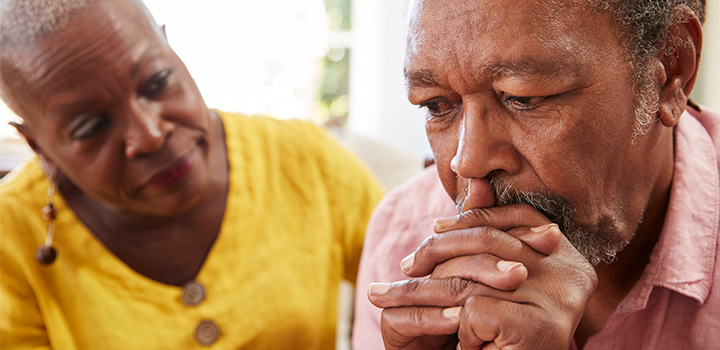Understanding PTSD

A normal part of every cancer journey is the rollercoaster ride of emotions that you experience including anxiety, fear and dread. When these feelings persist over time, intensify, or start affecting daily life, there could be signs of PTSD.
According to a recent study, approximately one in five cancer patients develop Post Traumatic Stress Disorder (PTSD) within six months of diagnosis with about 6% continuing to experience trauma-related symptoms four years later.
Cassey Chambers, operation manager of The South African Depression and Anxiety Group (SADAG) explains, “PTSD is an anxiety disorder that can occur after you experience a distressing/traumatic event that caused extreme fear, helplessness or horror. Although usually associated with developing after a traumatic event such as a serious accident or natural disaster, PTSD can also occur after a cancer diagnosis. Not everyone who experiences trauma develops PTSD, but many do – so, if you do, it’s important not to think of it as a sign of weakness.”
What are the symptoms of PTSD?
Symptoms can appear within a few weeks, months or several years after a traumatic event and although they differ from one person to the next, generally fall into three categories:
- Intrusive symptoms: re-living the event through nightmares and flashbacks. Often, people with PTSD suffer from persistent frightening memories of the traumatic event which set off the condition, and feel emotionally numbed by the ordeal
- Avoidance symptoms: staying away from people, places and things that remind you of the trauma; refusing to talk about your suffering and pain which can lead to loneliness and separation from family and friends
- Hyper-arousal symptoms: being nervous and jumpy, suddenly reacting in anger and irritation, having trouble sleeping and paying attention.
PTSD should never be ignored. It won’t ‘just go away’ and, left untreated, can lead to serious emotional and physical problems. These include depression, anxiety and panic disorders; suicidal thoughts and excessive behaviour (abuse of alcohol and drugs); physical problems such as tiredness, stomach pains, diarrhoea, asthma, muscle cramps, back ache, sleeping problems and heart problems, and it can also impact negatively on your personal and professional relationships.
What’s the treatment?
It’s essential to be gentle on yourself and to gift yourself the space and time to heal. Having lived through a trauma stresses both body and mind and no one expects you to act and behave as you did before. You don’t have to be embarrassed about the way you are feeling, nor do you need to be brave and try to ‘tough it out’. “You need to understand that this is a process and that you will get better but it does take time,” says Chambers.
“One of the best ways to recover is to talk about it. Trauma counselling is a good way to verbalize what you’ve experienced and how you are feeling, and will give you a safe place to work through the sadness and pain. Support groups allow you to share with others who have walked similar paths, while openly speaking to your family and friends will not only ensure that you’re all on the same page, but will enable them to identify how to best help you. Remember that they may also be struggling with what you’ve been through so you need to talk to them about it and work together as a team. Their love and support will play a pivotal role in your recovery so you need to let them in.”
Three ways to help yourself
- Take control of your life as soon as possible. As much as you’d love to do so, don’t run away. It’s far better to face your feelings and fears rather than to avoid them, so instead of taking leave or going on holiday, seek professional help
- Exercise as soon as your medical team gives you the go-ahead to do so - it does wonders for body, spirit and mind
- Get back to your normal routine. If you find this difficult, rope in the support of your family and friends. It is also important not to push yourself too hard so be kind to yourself and take things really slowly.
Get help here:
- Call SADAG on 0800 20 50 26 for referrals and advice
- Seek assistance from a medical professional: your GP, a psychologist, social worker or counsellor
- Make an appointment to chat to someone at your clinic, hospital or church
- Join a support group
All medical information found on this website including content, graphics and images, is for educational and informational objectives only. Discovery Health publishes this content to help to empower cancer patients and their families by promoting a better understanding of a cancer diagnosis. The views expressed by all of the contributing healthcare providers are their independent, professional medical opinions, aimed at supporting patients. These views do not necessarily constitute the views of Discovery Health.
The Discovery Health Medical Scheme is an independent non-profit entity governed by the Medical Schemes Act, and regulated by the Council for Medical Schemes. It is administered by a separate company, Discovery Health (Pty) Ltd, an authorised financial services provider.
Related articles
Depression and your cancer journey
The mixed bag of emotions you experienced when you were first diagnosed tends to rear its head throughout your cancer journey, even when you’ve finally completed treatment. Relief is coupled with the euphoria of having come through the many challenges.
Stages of survivorship: life after cancer
Thanks to ongoing breakthroughs in modern medicine, more and more people live full and productive lives, post cancer diagnosis and treatment. Today, 'survivorship' is recognized as a specialized field, playing a pivotal role in every cancer journey.
Survivorship: getting out of your cancer routine
The end of your cancer treatment heralds what, for some, is a daunting new phase – so-called 'Survivorship'. This stage of a cancer journey takes some adjustment, and there is plenty of support out there to help you to find your 'new normal'.